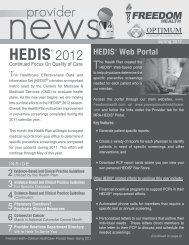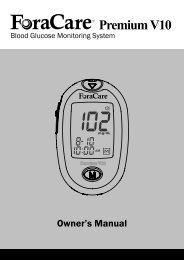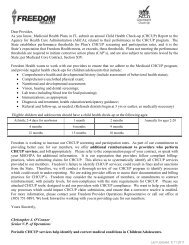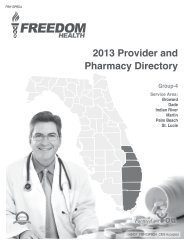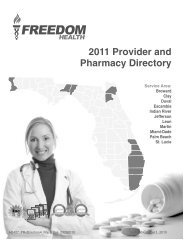Chronic/Congestive Heart Failure - Freedom Health
Chronic/Congestive Heart Failure - Freedom Health
Chronic/Congestive Heart Failure - Freedom Health
Create successful ePaper yourself
Turn your PDF publications into a flip-book with our unique Google optimized e-Paper software.
ABOUT HEART FAILURE
Because the more you know,<br />
the healthier you can be.<br />
What You’ll Find<br />
Attitudes and Beliefs<br />
<strong>Heart</strong> <strong>Failure</strong>—What Is It?<br />
Where You’ll Find It<br />
Page<br />
4-5<br />
This booklet is designed to help you understand<br />
heart failure and the things you can do every day<br />
to stay healthy.<br />
As always, talk to your doctor for more information.*<br />
Taking your medicine as directed by your doctor is<br />
one of the most important things you can do. If<br />
you’re like most people, this may be easier said<br />
than done.<br />
My <strong>Heart</strong> <strong>Failure</strong> Goals—What Are They? 6-7<br />
Taking Medicines<br />
<strong>Heart</strong> <strong>Failure</strong> Medicines—How Do They Work? 8-9<br />
My Medicines—How Can I Get the Most From Them? 10-11<br />
Lifestyle<br />
Sticking With My Medicines—What Will Work? 12-13<br />
Watching My Symptoms—How Do I Take Charge? 14-15<br />
<strong>Health</strong>y Eating and Activity—How Can They Help? 16-17<br />
Watching My Weight—Weight Record 18-19<br />
Talking With My <strong>Health</strong>care Team<br />
My Doctor Visits—How Can I Get Ready? 20-21<br />
Help From Others<br />
*The term “doctor” is used throughout this booklet to represent<br />
your healthcare provider and also includes nurse practitioners<br />
and physician assistants.<br />
<strong>Heart</strong> <strong>Failure</strong> Support—Where Can I Go for Help? 22-23<br />
About My <strong>Heart</strong> <strong>Failure</strong> Care Record<br />
Back<br />
2<br />
3
Attitudes and Beliefs<br />
“<br />
4<br />
<strong>Heart</strong> <strong>Failure</strong>—What Is It?<br />
“<br />
Does heart failure mean my heart has stopped<br />
working?<br />
<strong>Heart</strong> failure does not mean<br />
your heart stops working.<br />
It occurs when damage to<br />
the heart weakens its pumping<br />
power. Your heart must work<br />
harder to keep blood moving<br />
through your body.<br />
Although it may sound scary,<br />
heart failure can be managed.<br />
What causes heart failure?<br />
In heart failure, the weakened heart cannot pump as strongly.<br />
There are many things that can damage your heart and lead<br />
to heart failure over time. They include:<br />
• High blood pressure<br />
• <strong>Heart</strong> attack<br />
• Coronary artery disease<br />
• Diabetes<br />
• Injury to the heart or<br />
a birth defect<br />
• Severe lung disease<br />
Strong<br />
outflow<br />
Strong<br />
pumping<br />
action<br />
A healthy heart can easily pump<br />
oxygen-rich blood throughout<br />
your body.<br />
Reduced<br />
outflow<br />
Weak<br />
pumping<br />
action<br />
In heart failure, the weakened heart<br />
cannot pump as strongly.<br />
What does heart failure feel like?<br />
Patients with heart failure may<br />
experience some of these<br />
symptoms but not necessarily<br />
all of them.<br />
• Shortness of breath<br />
• Faster heartbeat<br />
• Feeling extra tired<br />
• Swollen ankles, legs, or belly<br />
• Weight gain (from fluid)<br />
• Frequent cough<br />
• Trouble sleeping because of shortness of breath<br />
Taking care of heart failure every day<br />
Today, there is no cure for certain types of heart failure. But these<br />
steps can help you lead a longer life with fewer health problems.<br />
Take your medicines as directed by your doctor.<br />
Keep your weight in a healthy range.<br />
Eat foods that are low in salt and low in fat.<br />
If you smoke, quit.<br />
Over time, fluid may leak into<br />
your lungs and cause<br />
breathing problems.<br />
Get regular, moderate exercise if your doctor approves.<br />
There are steps you can take now to help you feel better.<br />
Use the goal checklist on the next page to set your goals.<br />
5
Attitudes and Beliefs<br />
6<br />
My <strong>Heart</strong> <strong>Failure</strong> Goals—<br />
What Are They?<br />
You are the most important person in managing your heart failure.<br />
Talk with your doctor to help you choose one or more goals you<br />
are ready to work on now.<br />
Goal 1<br />
Goal 2<br />
Goal 3<br />
Goal 4<br />
Weight<br />
I will weigh myself every day at the same time,<br />
using the same scale.<br />
I will try to reach and/or stay at my goal body<br />
weight of _____________.<br />
I will call my doctor if I gain weight for ___ straight<br />
days or gain more than ____ pounds in a day.<br />
Symptoms<br />
I will check my feet and ankles every day for signs<br />
of swelling.<br />
I will call my doctor if any of my symptoms get worse.<br />
Medicines<br />
I will take my medicine(s) as directed by my doctor.<br />
I will call my doctor if I have any problems.<br />
Rest<br />
I will get enough rest at night and take breaks<br />
during the day if I need them.<br />
If I have trouble sleeping, I will call my doctor.<br />
Goal 5<br />
Goal 6<br />
Goal 7<br />
Goal 8<br />
Goal 9<br />
Smoking<br />
I will talk to my doctor about ways to quit smoking.<br />
Alcohol<br />
I will avoid or greatly lower the amount of alcohol<br />
I drink each day.<br />
Diet<br />
I will follow a low-salt, low-fat, high-fiber diet<br />
based on my doctor’s instructions.<br />
My goal is to drink ____ glasses of fluid a day.<br />
Sodium (Salt) Use<br />
My sodium goal will be ______ mg per day.<br />
Exercise<br />
I will exercise for __minutes __days per week<br />
as directed by my doctor.<br />
The best exercises for me are___________<br />
___________________________________.<br />
EMERGENCY<br />
Call 911 right away if you have chest pain/tightness<br />
or feel very short of breath.<br />
7
Taking Medicines<br />
8<br />
<strong>Heart</strong> <strong>Failure</strong> Medicines—<br />
How Do They W ork?<br />
There are several types of medicines for heart failure.<br />
You may need more than one medicine to control your<br />
heart failure.<br />
<strong>Heart</strong> failure medicines can:<br />
• Help improve symptoms<br />
• Help you feel better<br />
• Help you stay out of the hospital<br />
• Help reduce your chances of death from heart failure<br />
1. ACE inhibitors widen blood vessels.<br />
• ACE inhibitors make it easier for the heart to pump<br />
blood through your body.<br />
2. Beta-blockers improve the way your heart works.<br />
• Beta-blockers help widen blood vessels and keep the<br />
heart from beating too fast.<br />
3. Diuretics, or “water pills,” help your body get rid<br />
of extra fluid and sodium.<br />
• Diuretics can help you breathe easier. They also reduce<br />
the swelling in other parts of your body (eg, feet and<br />
lower legs).<br />
4. Digoxin, or digitalis, helps your heart pump more strongly.<br />
• Digoxin can help reduce your symptoms and help you<br />
function better.<br />
How to help yourself<br />
W eigh yourself daily . If your weight goes up, you may<br />
have excess water. Keep a daily record of your weight.<br />
Use less salt. Your doctor will probably suggest a<br />
low-salt diet. Eating salt makes the body retain water.<br />
Eat a healthy , balanced diet. Eating well will help<br />
you stay at a healthy weight.<br />
Stay active. Physical activity will make your muscles<br />
stronger. This can help you feel better and do your<br />
daily tasks more easily.<br />
Don’ t smoke. If you do smoke, talk to your doctor about a<br />
program to help you quit.<br />
A void alcohol. Too much alcohol may worsen high<br />
blood pressure and heart failure. Alcohol is also high<br />
in calories.<br />
Get plenty of rest. Take breaks during the day if you<br />
need them.<br />
Work with your doctor and do all that you can to keep<br />
your heart healthy. Take care of yourself so you can<br />
manage your heart failure and feel better.<br />
9
Taking Medicines<br />
My Medicines—How Can I Get<br />
the Most From Them?<br />
Fill out the medicine chart below for all the medicines you<br />
take. This will help you know how, when, and why you take<br />
each medicine. Make sure you know the name, exact shape,<br />
color, and any words on your medicines.<br />
“<br />
I can live healthy and stay<br />
healthy with heart failure.<br />
“<br />
• Mark medicine refill dates on a calendar.<br />
• Use reminder notes to remember to take<br />
your medicines.<br />
Name and Strength<br />
of Medicine<br />
How Much<br />
I Take<br />
When I<br />
Take It<br />
I Take<br />
It For<br />
What My Pill<br />
Looks Like<br />
Dates to<br />
Refill Rx<br />
Special Instructions<br />
10<br />
Doctor’s office contact name / phone number<br />
Pharmacy contact name / phone number<br />
11
Lifestyle<br />
“<br />
12<br />
Sticking With My Medicines—<br />
What Will W ork?<br />
You and your doctor can work as a team to help<br />
make life with heart failure easier. Taking your<br />
heart failure medicine as directed by your doctor<br />
is one of the most important things you can do<br />
to stay healthy.<br />
Not taking your heart failure medicine as directed by your<br />
doctor means:<br />
• Your medicines will not work the way they should.<br />
• You may have trouble doing daily tasks.<br />
• Your heart failure symptoms may get worse.<br />
• You may need to go to the hospital.<br />
“<br />
I sometimes forget to take my medicine<br />
every day.<br />
Taking more than one medicine at different times each day<br />
can be hard. The key is to create a routine that fits your life:<br />
• Where possible, take your medicines with other daily<br />
habits, like in the morning when brushing your teeth or<br />
in the evening with dinner. Talk to your doctor about a<br />
routine.<br />
• Ask your doctor if there are medicines you can take less<br />
often. A simpler medicine schedule may help you.<br />
“<br />
If you forget doses often:<br />
• Use a pill box marked with the days<br />
of the week. Take it with you when<br />
you are away from home.<br />
• Wear a watch. Set an alarm.<br />
Leave yourself a note on the<br />
bathroom mirror.<br />
• Keep your medicine in a place<br />
where you will see it daily.<br />
If you forget to refill your medicine on time:<br />
• Mark a calendar with “Refill on [date]”. Choose<br />
a date about a week before you will run out.<br />
• Make sure you have enough refills to last you until<br />
your next doctor visit.<br />
• Ask your pharmacy to send<br />
you reminders to refill your<br />
prescription.<br />
“<br />
I’m feeling better. Why do I need to take all<br />
these medicines?<br />
Taking your medicine every day may be why you feel better.<br />
If you skip your medicines, your symptoms will likely return<br />
or become worse. Stick with your medicine so you can<br />
stay healthy and out of the hospital.<br />
13
Lifestyle<br />
W atching My Symptoms—<br />
How Do I T ake Charge?<br />
Taking your medicines the right way is one of the most<br />
important things you can do for your health. Ask your doctor<br />
to help you fill out your plan. A plan can be very helpful,<br />
especially when your symptoms get worse.<br />
Date: / /<br />
Doctor/Phone:<br />
Emergency number:<br />
Target weight:<br />
Call your doctor if you notice ANY of the following:<br />
Weight gain of 2 or more pounds in a day or 4 pounds<br />
in a week<br />
Increased swelling in ankles, legs, or belly<br />
Increased shortness of breath, especially when lying<br />
flat (eg, you may have to sleep sitting up)<br />
Extreme tiredness<br />
A cough that won’t go away; or coughing up pink mucus<br />
<strong>Heart</strong>beat is very fast<br />
You feel your heart is skipping beats<br />
Feeling restless, dizzy, or woozy<br />
Nausea or lack of appetite<br />
Go to the emergency room (or call 911) immediately if:<br />
14<br />
Target blood pressure:<br />
Action:<br />
Take medicines as directed by doctor.<br />
Check your weight every day and write it down.<br />
Follow a low-salt diet and avoid alcohol.<br />
Get regular physical activity if your doctor approves.<br />
Check blood pressure if instructed.<br />
If you smoke, quit.<br />
You have pain or discomfort in your chest, neck, arm,<br />
jaw or shoulder that does not go away when you rest<br />
or take nitroglycerin<br />
You have any other medical problems, including:<br />
– Severe shortness of breath<br />
– Unexplained sweating or weakness<br />
– Light-headedness, dizziness, or fainting<br />
You have difficulty with speech, sudden weakness in<br />
your arms or legs, or other symptoms of stroke<br />
You have a fainting spell or lose consciousness<br />
15
Lifestyle<br />
Eating Right<br />
Eating right is one way to help you take charge<br />
of your health. It will also give you more energy.<br />
• Eat more fresh fruits and vegetables and<br />
fewer fatty foods. This will help you keep to your<br />
goal weight.<br />
• Cut out salty foods. This can keep you from holding<br />
on to extra water.<br />
• Ask your doctor how much fluid to drink each day.<br />
16<br />
<strong>Health</strong>y Eating and Activity—<br />
How Can They Help?<br />
Tips for cutting out salt:<br />
• Take the salt shaker off the table and don’t<br />
add salt when cooking, baking, or eating.<br />
• Use pepper and salt-free spice blends to give<br />
food flavor. Try adding lemon juice, garlic, and herbs.<br />
• Avoid processed foods. Some canned soups have almost<br />
one half of your daily sodium limit in just one serving.<br />
• Read food labels to see how much sodium is in each<br />
serving. Most people with heart failure should get<br />
2,000 mg of sodium or less per day.<br />
Diuretics, or “water pills,” may cause people to lose<br />
potassium. Since your body needs potassium, your<br />
doctor should check your levels regularly.<br />
Stay Active<br />
Talk to your doctor about a regular exercise plan. It can help you:<br />
• Have more energy and sleep better<br />
• Build your strength, so daily tasks<br />
won’t be so tiring<br />
• Feel more upbeat and confident<br />
• Cope with stress<br />
• Lose weight<br />
Exercise Tips<br />
Your doctor will help you create the right exercise plan<br />
based on your health.<br />
• Your doctor can tell you how much exercise to get and<br />
which activities to avoid. Find exercise that you like to do.<br />
• Start off slowly and work up to exercising for 20-30<br />
minutes most days of the week.<br />
• Stop exercising right away and call your doctor if you feel:<br />
– Pressure or pain in your chest, neck, arm, jaw, shoulder<br />
– Dizzy, light-headed, or nauseous<br />
– More short of breath or tired than usual<br />
– Your heartbeat is too fast or too slow, or is skipping a beat<br />
If you’re not used to exercise or you are concerned about<br />
it, talk to your doctor. Your doctor may recommend a<br />
cardiac rehab program.<br />
17
Lifestyle<br />
Watching My Weight—<br />
Weight Record<br />
If you gain a lot of weight or gain weight very quickly, it may<br />
be a sign of fluid buildup. Your doctor may need to change<br />
your treatment. So keep track of your weight daily with this<br />
weight record. Weigh yourself each morning at around the<br />
same time.<br />
My Target Weight Is:<br />
Date Weight Date Weight<br />
Date Weight Date Weight<br />
18 19
Talking With My <strong>Health</strong>care Team<br />
“<br />
My Doctor V isits—<br />
How Can I Get Ready?<br />
You and your doctor are a team in managing your heart failure.<br />
To get the most from your treatment, talk openly and honestly<br />
with your doctor.<br />
“<br />
I’m embarrassed to ask my doctor<br />
some questions.<br />
• All questions are important. Do not be afraid to<br />
speak up if you do not understand something.<br />
• Ask a family member to join you for doctor visits.<br />
They can write down your doctor’s answers.<br />
• Some people who take diuretics, “water pills,” have to<br />
urinate more often. Ask your doctor when it is best to<br />
take your diuretic. You may be able to take it earlier in<br />
the day to avoid nighttime bathroom visits.<br />
Prepare before you go to your doctor’s office. Check off the<br />
statements that apply to you and discuss with your doctor.<br />
Since my last visit:<br />
I have not taken my medicine(s) as directed every day.<br />
My medicines have caused side effects that bother me.<br />
My symptoms have changed (better or worse).<br />
I have lost sleep due to my heart failure symptoms.<br />
I have noticed a sudden weight gain.<br />
If you have trouble understanding what your doctor says:<br />
• Ask for written information about your medicine. Is<br />
it available in large print or another language?<br />
• Review the following checklist before each doctor’s visit.<br />
I have felt “sad” or “hopeless” much of the time.<br />
I have made progress on my heart failure goals.<br />
Side effects may occur with any medicine. Tell your<br />
doctor about any side effects you may have or have had<br />
in the past. You should first talk with your doctor if you<br />
are considering stopping your medicine.<br />
20<br />
21
Help From Others<br />
“<br />
<strong>Heart</strong> <strong>Failure</strong> Support—<br />
Where Can I Go for Help?<br />
I need help. I cannot do this on my own.<br />
• Ask a family member or friend to support you, like<br />
going with you to your next doctor visit.<br />
“<br />
• Ask your doctor about a heart failure support group. You<br />
can find a group in your area at www.americanheart.org.<br />
If you have trouble paying for your medicines:<br />
• Visit www.togetherrxaccess.com, www.gskforyou.com,<br />
or www.PPARx.org for more information.<br />
• Another option is to call 1-800-Medicare or visit<br />
www.medicare.gov.<br />
For more help and information, contact one or more of these<br />
heart failure resources:<br />
1on1<strong>Health</strong> ®<br />
www.1on1health.com<br />
American <strong>Heart</strong> Association (AHA)<br />
1-800-AHA-USA-1 (1-800-242-8721)<br />
www.americanheart.org<br />
National <strong>Heart</strong>, Lung, and Blood Institute Information Center<br />
1-301-592-8573<br />
www.nhlbi.nih.gov<br />
<strong>Heart</strong> <strong>Failure</strong> Society of America<br />
1-651-642-1633<br />
www.hfsa.org<br />
Have you felt down or hopeless?<br />
It’s normal for people with heart failure to feel down from<br />
time to time. But if you have been feeling down much of<br />
the time, talk to your doctor.<br />
To learn more about what may be getting in the way of<br />
taking your medicines, go to www.takingmeds.com.<br />
Many of the Web sites above are external to GlaxoSmithKline. GlaxoSmithKline<br />
does not have editorial control over the content of the information provided<br />
in these Web sites and therefore does not guarantee their accuracy and<br />
completeness.<br />
22<br />
23
About My <strong>Heart</strong> <strong>Failure</strong><br />
Care Record<br />
Work with your doctor to decide how often you need the tests<br />
or services listed below. List your personal goals.<br />
Test/Service My Goal / / / /<br />
Blood Pressure<br />
Weight<br />
Smoking Status: Plan to Quit<br />
Review Medicines<br />
Review Symptoms<br />
Total Cholesterol<br />
LDL (“bad cholesterol”)<br />
HDL (“good cholesterol”)<br />
Triglycerides<br />
Flu Vaccine<br />
Pneumonia Vaccine<br />
Ejection Fraction<br />
Exercise Tolerance Test<br />
Fasting Blood Sugar<br />
© 2007 The GlaxoSmithKline Group of Companies All rights reserved. Printed in USA. HMI359RO October 2007



